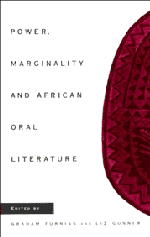Book contents
- Frontmatter
- Contents
- List of contributors
- Preface
- Note on transcription
- 1 Introduction: power, marginality and oral literature
- Part I Orality and the power of the state
- Part II Representing power relations
- Part III Oral forms and the dynamics of power
- Part IV Endorsing or subverting the paradigms: women and oral forms
- Part V Mediators and communicative strategies
- 15 Power and the circuit of formal talk
- 16 Praise splits the subject of speech: constructions of kingship in the Manden and Borgu
- 17 Beyond the communal warmth: the poet as loner in Ewe oral tradition
- Bibliography
- Index
16 - Praise splits the subject of speech: constructions of kingship in the Manden and Borgu
Published online by Cambridge University Press: 18 December 2009
- Frontmatter
- Contents
- List of contributors
- Preface
- Note on transcription
- 1 Introduction: power, marginality and oral literature
- Part I Orality and the power of the state
- Part II Representing power relations
- Part III Oral forms and the dynamics of power
- Part IV Endorsing or subverting the paradigms: women and oral forms
- Part V Mediators and communicative strategies
- 15 Power and the circuit of formal talk
- 16 Praise splits the subject of speech: constructions of kingship in the Manden and Borgu
- 17 Beyond the communal warmth: the poet as loner in Ewe oral tradition
- Bibliography
- Index
Summary
To focus on ‘praise’ practices, and to seize the configurations of subjects of speech posited by praise genres, is to zero in on what Amselle has described as the intra-ethnic and inter-ethnic ‘politics of the concept of person’ and of concepts of group identity (1990: 201–4). Kingship and its mode of construction have been traditionally central to this politics, and continue to facilitate insights into the management of the act of praise.
‘Praise’ does not always mean praise in the conventional sense of the word (see Barber 1991: 13). Sumanguru's praises in the Sunjata epic celebrate what may be described as Sumanguru's violence and cruelty — his dressing himself in human skin. What praise discourses postulate is their capacity to seize upon the ‘truth’ of the praisee's being, and to activate it and generate acknowledgement of it by the praisee's private self and by the public at large. To achieve this, praise operates on ‘the individual’ not as if on an entity primarily defined by its boundedness, but rather as if on one whose singularity is constituted precisely by its participation in what lies beyond its boundaries. In this perspective, the ‘person’ is a swirling forcefield which is widely responsive to other force fields (Hampaté Ba 1973: 181, 191; Beattie 1980: 316–7; Barber 1991: 36–7, 75).
- Type
- Chapter
- Information
- Power, Marginality and African Oral Literature , pp. 225 - 243Publisher: Cambridge University PressPrint publication year: 1995
- 3
- Cited by

